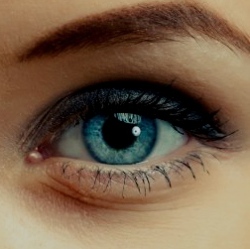
3 year clinical trial results of the Argus II retinal implant (“bionic eye”) have found that the device restored some visual function and quality of life for 30 people blinded by retinitis pigmentosa, a rare degenerative eye disease. The findings also showed long-term efficacy, safety and reliability for the device.
Retinitis pigmentosa is an incurable disease that affects about 1 in 4,000 Americans and causes slow vision loss that eventually leads to blindness. Using the Argus II, patients are able to see patterns of light that the brain learns to interpret as an image.
The system uses a miniature video camera connected to the glasses to send visual information to a small computerized video processing unit and battery that can be stored in a pocket. This computer turns the image to electronic signals that are sent wirelessly to an electronic device surgically implanted on the retina in the eye.
The Argus II received FDA approval as a Humanitarian Use Device (HUD) in 2013 and in Europe Argus II received the CE Mark in 2011 and was launched commercially in Italy, Germany, France, Spain, The Netherlands, Switzerland and England. The clinical trial was conducted in the United States and Europe. All of the study participants had little or no light perception in both eyes.
The researchers conducted two visual-function tests using both a computer screen and real-world conditions: finding and touching a door and identifying and following a line on the ground. A Functional Low-vision Observer Rated Assessment (FLORA) was also performed by independent visual rehabilitation experts at the request of the FDA to assess the impact of the Argus II system on the subjects’ everyday lives, including extensive interviews and tasks performed around the home.
The visual function results indicated that up to 89 percent of the subjects performed significantly better with the device. The FLORA found that among the subjects, 80 percent received benefit from the system when considering both functional vision and patient-reported quality of life, and no subjects were affected negatively.
